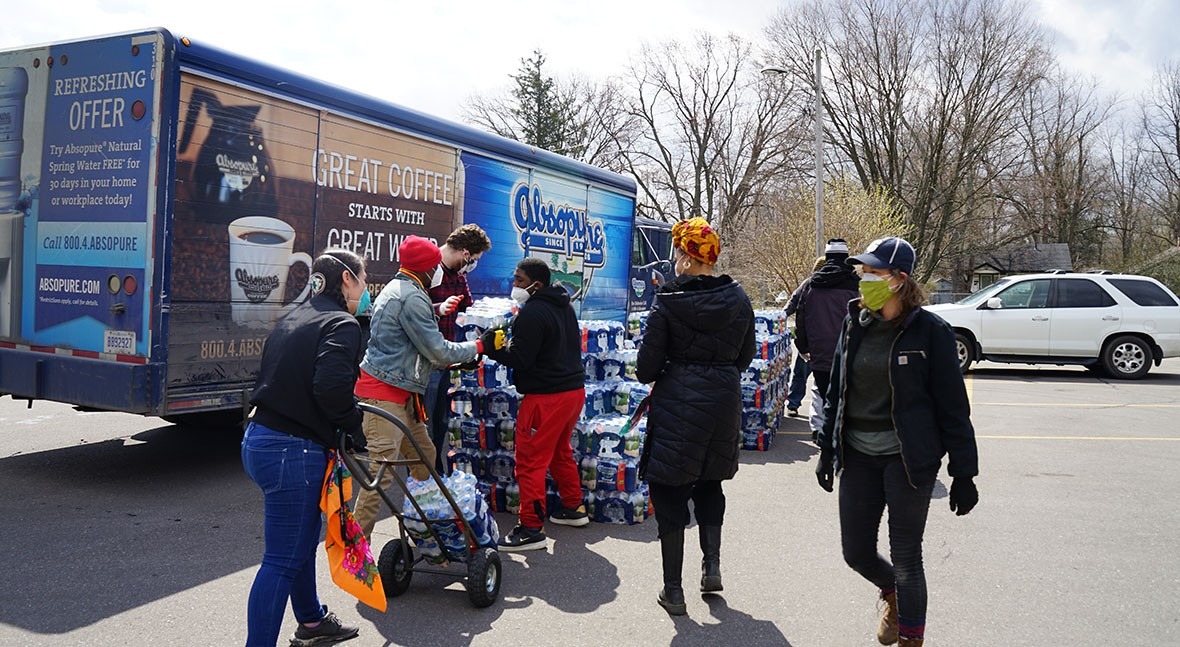We the People of Detroit is a community-based grassroots organization dedicated to community coalition building and to the provision of resources that inform, train and mobilize the citizens of Detroit and beyond to improve their quality of life.
Water insecurity poses a significant challenge to both health and economic development throughout the world. Two thirds of the world’s population experience water scarcity and 2.5 billion lack access to basic sanitation. In the U.S., the issue is growing more severe as water costs rise and the number of people living in poverty grows. In Detroit, Michigan nearly 100,000 residents have been disconnected from the city’s water system for lack of payment, with most living in the area’s poorest neighborhoods. These same areas of the city have been some of the hardest hit by COVID-19 this year.
For example, people over the age of 60 represent 42% of all COVID-19 cases and 82% of deaths in Detroit. A majority of residents over 65 live in the zip codes experiencing the highest water shutoff rates in the city. Though we know the virus spreads more easily in shared living facilities, including nursing homes, our research shows that in these zip codes, the majority of cases were transmitted by community spread. The data is clear – the poorest residents of Detroit are experiencing the highest level of water shutoffs and the largest impact of COVID-19.
The data is clear – the poorest residents of Detroit experience the highest level of water shutoffs and largest impact of COVID-19
In September, the Journal of Public Health published new research showing water insecurity has a significant effect on psychological distress. The paper, based on a case study of the emotional toll of water insecurity on Detroit residents, is the first in the country to quantify the effect of unaffordable water rates on mental health. Written by my colleagues and I, including We the People of Detroit Community Research Collective’s Dr. Nadia Gaber, the results are a culmination of years of community engagement and grassroots support, thousands of volunteer hours, and six months of survey design and research.

While the physical and economic impacts of water insecurity are well documented, the emotional and social tolls are less well understood. Our study is the first to examine the relationship between water insecurity and psychosocial distress in the U.S. For our study, we had to design a scale of water insecurity relevant to the local community. We examined five issues related to water insecurity: current water supply status; cost of monthly water bills; perceived water affordability; incidence of sewer flooding; and economic trade-offs attributable to the cost of water.
While the physical and economic impacts of water insecurity are well documented, the emotional and social tolls are less well understood
Data was collected through participant observation at community meetings, informal interviews at Detroit Water and Sewage Department customer service centers, and semi-structured interviews with residents. To measure psychological distress we used ten self-assessment questions relating to anxiety and depression based on the well-validated Kessler Psychological Distress Scale.
We found a substantial, statistically significant effect of water insecurity on psychological distress. For example, receiving a water shutoff notice was associated with a 2.31 increase in the 5-point psychological distress scale. Focusing on the residents of the Brightmoor neighborhood of Detroit, we found a significant relationship between three of our measures of water insecurity and psychological distress.
The mental health effects experienced by Detroit residents during the growing water crisis – surely exacerbated by the ongoing pandemic -- provides an essential component to understanding the long-term impacts of escalating water costs in the U.S. COVID-19 increases the urgency in our response to end it. Our study is also the first of its kind to demonstrate the mental health impacts of widespread water disconnections in an urban U.S. city and as such, speaks to the value of community-based participatory research. Access to these highly vulnerable communities was greatly facilitated during our research by the inclusion of local leaders who garner community trust.
Around the world, COVID-19 has shown a spotlight on the link between public health and access to water – and the U.S. is no exception
A United Nations report in 2014 found Detroit’s water shutoffs violate international human rights, but the cutoffs have persisted. Though temporary restarts have been instituted during a global pandemic, there are many areas of the country without any protection from shutoffs even during this health emergency. Around the world, COVID-19 has shown a spotlight on the link between public health and access to water – and the U.S. is no exception. Our recent case study was written well before COVID-19 became a global pandemic, but activists in Michigan have long been warning of the potential for infectious diseases to spread rapidly among the poor because of water shutoffs. We are continuing to draw on the power of community to study the spread of the virus in our city, paying attention to where it hits hardest, and why. We are also continuing to deliver emergency water to those in need through our Water Rights Hotline, knowing that this is essential to protecting peoples’ physical and mental health throughout this pandemic. The effects of COVID-19 only make the issue clearer – access to affordable water and sanitation is a human right, and shutoffs must end immediately to protect public health in Detroit and across the country.



